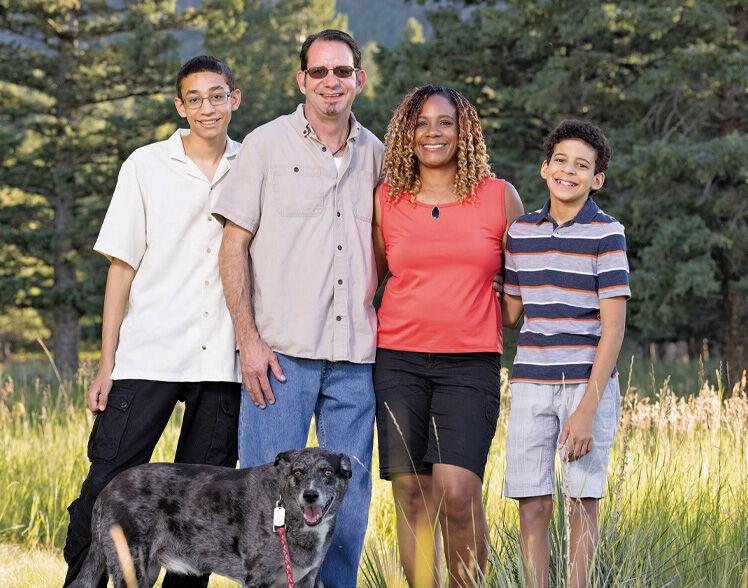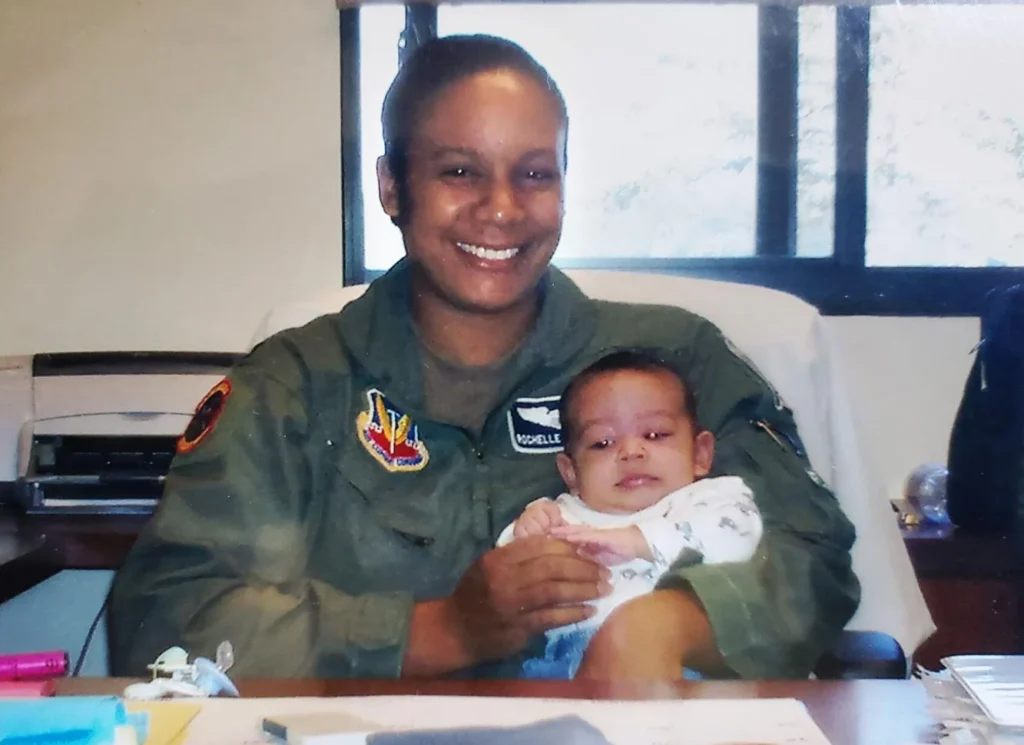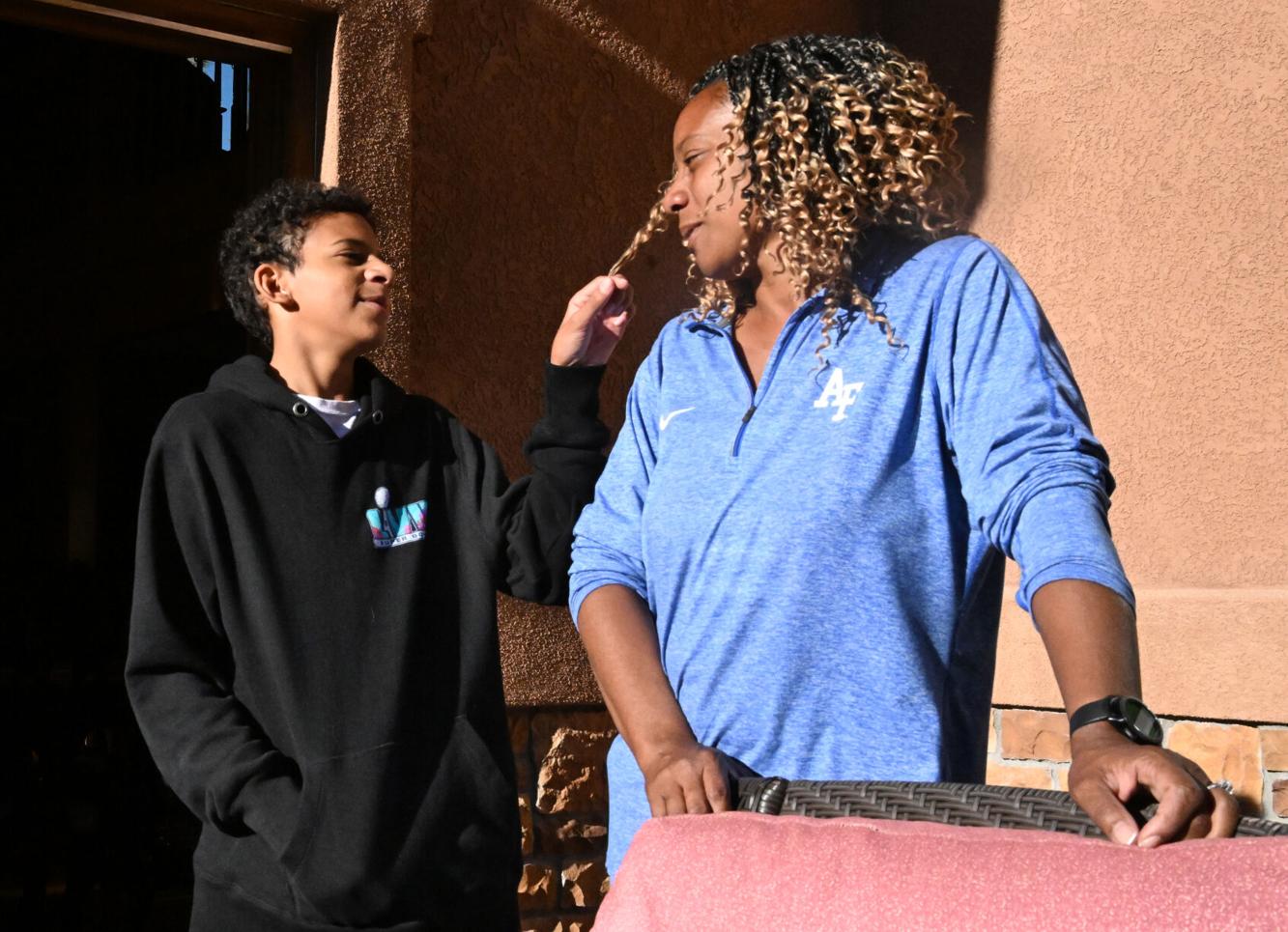IN THE NEWS
Motherhood wasn’t part of the mission for first Black female fighter pilot, until it was
Rochelle Kimbrell, a retired Air Force lieutenant colonel, is a mom to two teen boys. Being a mother, she says, is “way more challenging than being a fighter pilot.”
Read the full story on gazette.com | By Stephanie Earls
Rochelle Kimbrell knew by fourth grade what she wanted to do with her life, and spent the next 15 years on a trail-blazing trajectory of singular purpose.
For the first Black female fighter pilot in the history of the U.S. Air Force, becoming a mother was an entirely different kind of mission, an unknowable challenge and future without maps, where flying blind is often part of the job.
“Being a fighter pilot … there’s unpredictability, but you’ve probably thought through about 99% of the scenarios you’ll face,” said Kimbrell, 48, a retired lieutenant colonel in the Air Force and mom to two teen boys. “With kids, there is zero predictability, every second of every day. I think it’s way more challenging than being a fighter pilot.”

The Kimbrell family from left: Kade, father Travis, mom Rochelle, Jakeb, and dog Beau.
The daughter of Guyanese immigrants, Kimbrell was born in Lafayette, Ind., where her father was pursuing a doctoral degree in civil engineering at Purdue University. By the time she was in kindergarten, the family had relocated to Parker, which is where she got her first glimpse of the future she craved and how to achieve it, thanks to host families who welcomed Air Force Academy cadets into their homes and lives during the holidays.
“Some of them were talking about being fighter pilots … and I was, like, ‘What is this fighter pilot thing?’ I want to do that,” said Kimbrell, who set about “reverse engineering” her life to get into the academy.
Though they didn’t necessarily understand her passion for flight and knew nothing about the military, Kimbrell’s parents supported her choices any way they could, she said. For her 14th birthday, her father gave her an introductory Discovery Flight lesson, which “absolutely sealed the deal” about her career choice.
She joined the Civil Air Patrol, the nonprofit civilian auxiliary of the Air Force, in eighth grade and got her pilot’s license at 17, soloing in an airplane before she had her driver’s license.
“Going against the grain became kind of my thing,” said Kimbrell, who received appointments to both the U.S. Naval Academy and the Air Force Academy after high school. She stuck with the AFA, where she went on to fence for a semester and was a member of the academy falconry team.
Kimbrell graduated in 1998 and was awarded her pilot wings the following year at Laughlin Air Force Base in Texas. After F-16 training in Arizona, in August 2000, she officially — quietly — entered the history books.
“That’s what kind of marked me as the first Black female to fly fighters” — not only for the U.S. Air Force, but any branch of the service, said Kimbrell, whose likeness, rendered in bronze for the Women’s Legacy Memorial, stands alongside a statue of World War II icon Rosie the Riveter outside the courthouse in the Indiana town where she was born.
“I was aware of my surroundings and that I was a singular entity going through this process, but I didn’t know the historical data points and I was really too busy and learning too much to really focus on all of that,” she said.
During her first operational assignment, to the 13th Fighter Squadron in Misawa, Japan, Kimbrell flew F-16 Fighting Falcons on deployments to Turkey and Saudi Arabia in support of Operation Northern and Southern Watch, becoming the first female pilot to fly combat missions for the 35th Fighter Wing.
Career goal accomplished, and then some, by 25, Kimbrell said she took a pause from the high-flying grind, and realized she didn’t like the silence at home.
“I wasn’t going to get married, have kids … I would fly ‘til I die,” Kimbrell said. “But now I was a fighter pilot, and it was kind of lonely.
“The possibility that maybe there was more out there entered my mind.”
Soon after, so did the fellow service member who would make those possibilities real.
“It was the truest version of love at first sight,” said Travis Kimbrell, a jet engine mechanic and Alabama native. “As soon as I saw Rochelle, I was like, ‘I can’t not be with that woman,’ and I did everything I could to make sure we were going to be together.”
He worked up the courage to ask for a date during deployment in Saudi Arabia.
“I was like, ‘when we get back to Japan, think we can go get some sushi?’ She was like,’ that’d be great, I love sushi,’” Travis said. “I’d never even had sushi.”
The couple celebrates their 19th anniversary in June.
Their older son, 17-year-old Kade, was born by emergency C-section while the Kimbrells were on a non-flight assignment in Georgia.
Any qualms or questions she had about her decision to have children disappeared the moment she held Kade in her arms.
“I had emotions I never even knew a person could feel about another human being, and it was surprising to me. I didn’t know that was possible,” Kimbrell said. “I didn’t know somebody else could be that important, and could change your whole way of thinking. My priorities changed the minute I had him.”

Rochelle Kimbrell holds her young, son, Kade, who is now 6 feet, 1 inch tall.
Her love for flying fighter planes was undiminished, but the hurdles she faced — both personal and institutional — were about to get a lot more challenging.
“We were on the leading edge of women in fighters having kids,” Rochelle Kimbrell said. “The fighter community was not prepared, we were not prepared, nobody was prepared for what that was gonna really look like.”
Fighter planes, and military services in general, weren’t made with women in mind.
Consider: A jet pilot must stay hydrated in order to safely handle the G-forces to which they are exposed without passing out.
“They’re still working on ways for women to relieve themselves in the fighters,” Kimbrell said. “A lot of us flew dehydrated, because we didn’t have any way to relieve ourselves, which decreases our combat capability because you’re not at your best physically. And that’s just one example.”
Once the pilot of an ejection seat aircraft becomes pregnant, they’re not allowed to physically be in the airplane until after giving birth, Kimbrell said. Afterward, six weeks of maternity leave was standard at the time.
“I just got all my abdominal muscles cut open …,” said Kimbrell. “That makes it hard to pull nine G’s.”
Kade was about 6 months old when Kimbrell returned to air. The family deployed to Italy, where the new mom served with the 555 Fighter Squadron at Aviano Air Base.
“If anybody’s had kids they know that, for the first few years, it’s hit or miss if you sleep,” Kimbrell said. “And then going and flying jets. At 550 knots, 3 feet off the wing of somebody else. It was a crazy time. Much more than I had anticipated, for sure.”
Early on, the couple decided Travis would be the stay-at-home parent, an easy and natural dynamic for the yin-yang duo.
“I bring the flavor and the spice to the relationship, she brings the planning and the calming and the making sure everything works the way it’s supposed to,” Travis Kimbrell said. “I don’t think it could have worked out any other way.”
Rochelle said her husband is the linchpin that made their lives — and her career — possible. He “stepped up and owned it” in a culture and environment where stay-at-home dads are still far from the norm.
“It would not be possible to walk away from your young child and go do high-risk missions every day if you didn’t truly believe they were cared for and things at home were squared away,” she said.
It certainly wouldn’t have been possible to expand their family. Jakeb, 13, was born in Las Vegas, during Kimbrell’s assignment to Nellis AFB. The family moved to Monument in 2018.
Kimbrell retired from the military after 22 years, and now is self-employed as a public speaker, civilian flight instructor, and independent contractor instructor at the Air Force Academy’s Aero Club. She spends part of her free time helping introduce local youth to the love of flight through Civil Air Patrol, and as a volunteer mentor with the academy’s falconry team.
She’s also among the 2023 recipients of the Amway Hero Awards, which honor those who use their “voices, skills and compassion” to give back to their communities.
Kimbrell may be a trailblazer and hero out there, but at home, on this day, she’s just the person who made Kade wake up for dinner, and Jakeb change out of his pajamas before company arrived.

Rochelle Kimbrell’s son, Jakeb, plays with one of her curls outside their home in Monument.
As Travis prepared steaks for the grill, Jakeb plodded onto the porch for a sleepy hello and brief conversation.
“I’m glad I had the opportunity to have a cool mom,” said the teen, before dashing off to play a video game.
“And I’m glad I had the opportunity to have cool kids, too,” said his mom, the fighter pilot.
Read the full story here.

